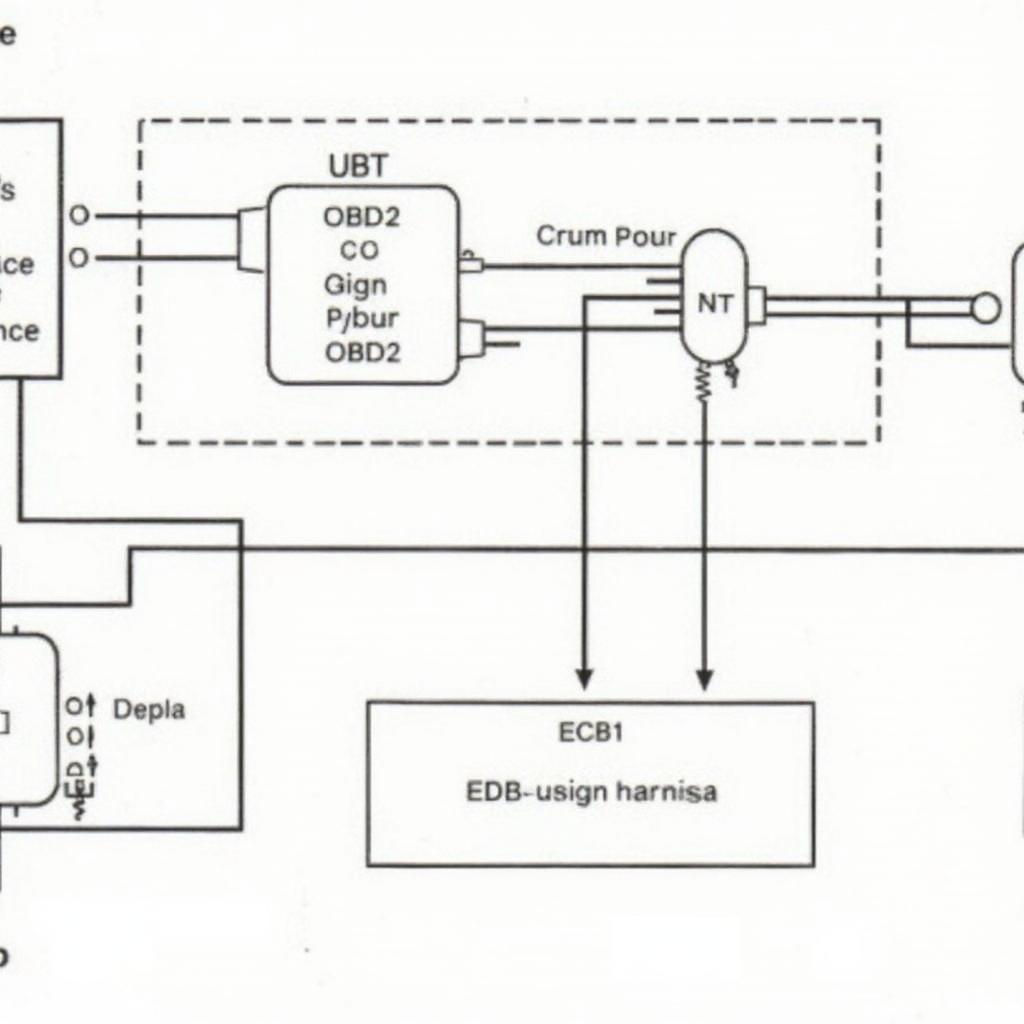OBD2 to OBD1 conversion is a popular topic among car enthusiasts, especially those working with older vehicles. This guide will delve into the intricacies of converting from OBD2 to OBD1, exploring the reasons behind this modification, the process involved, and the potential benefits and drawbacks.
Understanding the differences between OBD2 (On-Board Diagnostics II) and OBD1 (On-Board Diagnostics I) is crucial for a successful conversion. OBD2, implemented in most vehicles from 1996 onwards, offers more sophisticated diagnostics and standardized communication protocols. OBD1, prevalent in older models, is simpler but can present challenges for tuning and diagnostics with modern equipment. Why would someone want to revert to an older system? Let’s explore the motivations and practicalities of the OBD2 to OBD1 conversion.
Why Convert from OBD2 to OBD1?
There are several reasons why car owners might consider an OBD2 to OBD1 conversion. One primary reason is the desire for greater control over engine management, especially in older Honda and Acura models. Aftermarket engine management systems designed for OBD1 often offer more tuning flexibility and customization options than their OBD2 counterparts. acura obd2 to obd1 conversion provides specific details on this process for Acura vehicles.
Another motivation is cost. OBD1 ECUs (Engine Control Units) and tuning solutions can be significantly more affordable than OBD2 options, particularly for older, less common vehicles. This can make OBD1 a more budget-friendly choice for performance upgrades. Additionally, some enthusiasts prefer the simplicity of OBD1, finding it easier to troubleshoot and modify than the more complex OBD2 systems.
The OBD2 to OBD1 Conversion Process
The conversion process varies depending on the specific make and model of the vehicle, but generally involves several key steps. These include installing a conversion harness, replacing the ECU, and potentially modifying the wiring for the distributor and alternator. civic obd2 to obd1 alternator provides more information on alternator modifications for Honda Civic conversions.
A crucial component of the conversion is the OBD2 to OBD1 adapter. This adapter allows the OBD1 ECU to communicate with the vehicle’s sensors and actuators. Choosing the correct adapter is essential for a successful conversion. how to use obd2 to obd1 adapter explains the adapter selection and installation process in detail.
Understanding the Wiring
Understanding the wiring involved is paramount for a successful conversion. Incorrect wiring can lead to malfunctions and even damage to the vehicle’s electrical system. obd2 to obd1 honda distributor wiring provides detailed wiring diagrams and instructions specifically for Honda distributors.
 OBD2 to OBD1 Wiring Diagram
OBD2 to OBD1 Wiring Diagram
Distributor Conversion: A Closer Look
Often, converting the distributor is a necessary part of the OBD2 to OBD1 conversion. This typically involves swapping the OBD2 distributor for an OBD1 version. how to convert obd2 to obd1 dizzy offers a comprehensive guide to this specific aspect of the conversion.
“A proper OBD2 to OBD1 conversion requires meticulous attention to detail, especially with the wiring,” advises renowned automotive electronics expert, David Miller. “A thorough understanding of your specific vehicle’s wiring diagram is crucial for a successful and safe conversion.”
Benefits and Drawbacks of OBD2 to OBD1 Conversion
Converting from OBD2 to OBD1 offers several advantages, including increased tuning options, lower costs, and simplified diagnostics for some. However, there are also potential drawbacks to consider. OBD1 systems generally offer less precise engine management and emissions control compared to OBD2. This can potentially impact fuel efficiency and emissions compliance.
“While OBD1 offers tuning flexibility, remember that OBD2 systems provide advanced diagnostics and better emissions control,” notes automotive engineer, Sarah Chen. “Carefully weigh the pros and cons before making a decision.”
In conclusion, converting from OBD2 to OBD1 can be a viable option for car enthusiasts seeking greater control over their vehicle’s engine management, especially in older models. However, it’s essential to understand the process, potential benefits, and drawbacks before undertaking this modification. Thorough research and careful execution are key to a successful OBD2 to obd1 conversion.
FAQ
- Is it legal to convert from OBD2 to OBD1?
- What are the common issues encountered during conversion?
- Can I revert back to OBD2 after converting to OBD1?
- Which vehicles are best suited for this conversion?
- What tools are required for the conversion process?
- How much does a typical conversion cost?
- What are the long-term implications of this conversion?
For further assistance, please contact us via WhatsApp: +1(641)206-8880, Email: [email protected] or visit our office at 789 Elm Street, San Francisco, CA 94102, USA. We offer 24/7 customer support.